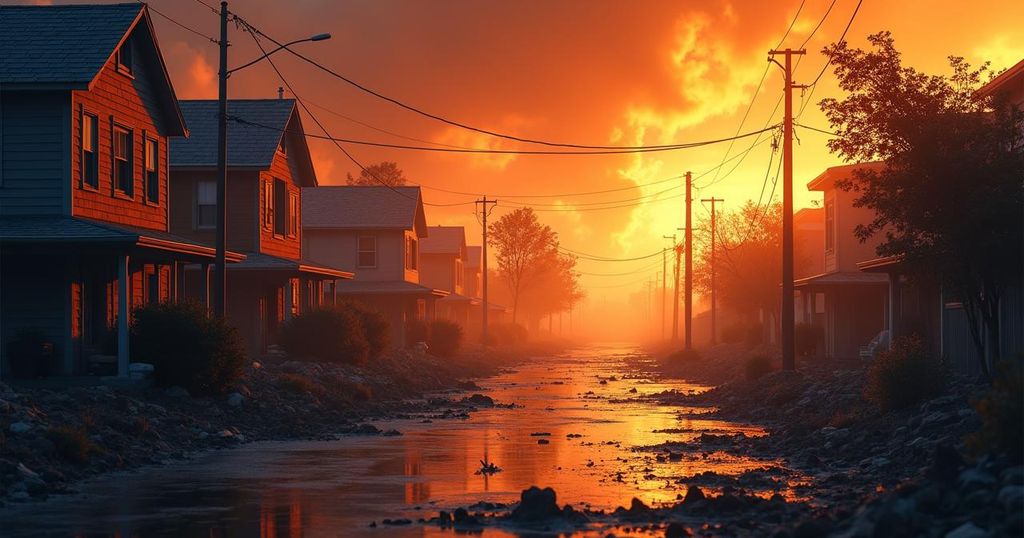Hurricane Helene: Catastrophic Impact on the Southeast and Response Efforts
Hurricane Helene, a category 4 storm, caused widespread destruction in the southeastern United States over the weekend, particularly in the Carolinas, resulting in over 100 fatalities and severe infrastructural damage. North Carolina Governor Roy Cooper and President Biden have initiated disaster responses, while political criticisms have arisen amid the crisis. Relief efforts face significant challenges due to flooding and infrastructure collapse, with a pressing need for resources and support from federal and state agencies.
Hurricane Helene, a devastating category 4 storm, inflicted massive destruction across the southeastern United States over the past weekend, with significant impacts recorded particularly in the Carolinas. The storm has resulted in over 100 fatalities and has obliterated entire towns, severely impacting critical infrastructure. The most pronounced devastation occurred in North Carolina, where mudslides and extensive flooding have induced catastrophic scenes, necessitating an urgent response from emergency services. Helene’s extensive path of destruction spanned approximately 500 miles, affecting states such as Florida, South Carolina, North Carolina, Georgia, Virginia, and Tennessee. In North Carolina alone, 37 lives have been lost and hundreds remain unaccounted for, with Buncombe County’s Asheville emerging as a focal point of the crisis. Asheville and nearby towns have experienced widespread power outages, communication failures, and complete road washouts, cutting them off from vital state resources. The storm caused severe damage to the city’s main water system, depriving residents of essential water supplies. “Many people are cut off because roads are impassable, they don’t have power or communications. Please know that we are sending resources and coordinating closely with local governments, first responders, state and federal partners, and volunteer organizations to help those impacted by this tragic storm,” North Carolina Governor Roy Cooper stated during a press conference. In response to the disaster, President Joe Biden authorized Major Disaster declarations for Florida and North Carolina, along with emergency declarations for multiple other states, including South Carolina and Georgia. According to the White House, over 3,300 federal personnel are actively assisting Hurricane Helene response efforts, spearheaded by the Federal Emergency Management Agency (FEMA). The destruction of key roadways in the Asheville area, combined with extreme flooding, has posed substantial challenges to first responders. Relief supplies are being airlifted into affected regions as agencies endeavor to restore communication lines throughout the Southeast. “We are working hard to get as many supplies in there — water obviously is a big thing,” Governor Cooper informed the media, citing the difficulty of assessing damage due to extensive flooding. Following a review of the disaster, President Biden expressed a desire to visit hard-hit areas once it is feasible for emergency operations. In Georgia, Governor Brian Kemp emphasized the importance of bipartisan disaster relief efforts in response to the crisis and addressed the necessity for a cohesive approach during a Monday press conference. The political landscape has also shifted in response to Hurricane Helene, with former President Donald Trump using the crisis as a platform to criticize the Biden administration. During a recent rally in Pennsylvania, Trump accused President Biden of negligence regarding the disaster response and condemned Vice President Kamala Harris for continuing her campaign schedule. As a countermeasure, the Harris campaign postponed scheduled events to focus on emergency relief efforts. Supporting these claims, FEMA Administrator Deanne Criswell noted in an interview that the increasing frequency and intensity of hurricanes are directly related to rising temperatures in the Gulf of Mexico, which foster the development of severe storms. This assertion aligns with warnings from climate scientists about the ramifications of escalating global temperatures on natural disaster severity, particularly affecting coastal areas. The ongoing situation sheds light on the interplay between climate change and natural disasters, reinforcing the urgent need for comprehensive disaster preparedness and response strategies.
Hurricane Helene represents a severe weather event catalyzed by climate change, manifesting in the form of category 4 hurricanes that inflict catastrophic consequences on communities, particularly along coastal regions. Understanding such storms’ history and systemic patterns allows for insights into their growing prevalence, largely attributed to rising global temperatures. The heightened intensity of hurricanes is a concern for disaster preparedness and response strategies across the United States, emphasizing the critical role of governmental and emergency services in mitigating damages and saving lives during such crises. Furthermore, the political backdrop during natural disasters often complicates relief efforts, as leaders navigate public expectations amid the chaos of devastation and recovery.
In summary, Hurricane Helene has wrought unprecedented destruction across the southeastern United States, particularly affecting the Carolinas and resulting in a significant loss of life and infrastructure. The urgent response from federal and state officials underscores the critical nature of disaster preparedness and collaboration in the wake of such tragedies. The political ramifications of disaster response also highlight the complexities inherent in crisis management. As the community reckons with the aftermath, the ongoing dialogue regarding climate change and its role in natural disasters remains crucial for future planning and resilience.
Original Source: www.rollingstone.com




Post Comment